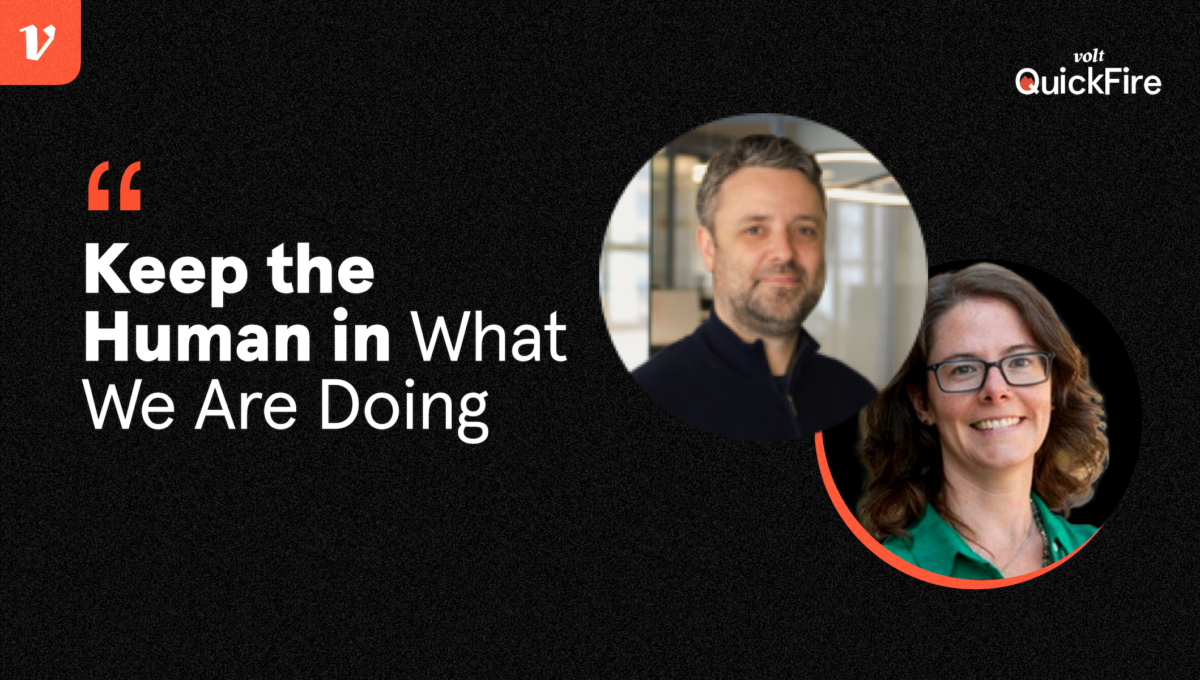Champlain College in Vermont focuses on innovative education and hands-on learning. By marketing its diverse programs, small class sizes and supportive community, the college provides students with real-world experience and industry connections. With the same commitment to experiential learning and personalized support, Champlain College’s online offerings ensure that students can engage in a high-quality educational experience from anywhere in the world. The college offers robust online programs, providing flexibility and accessibility for students seeking to pursue their education remotely.
Volt Publisher Kevin Renton sat down with Sarah McMaster, Champlain College’s executive director for marketing and enrollment management to discuss what’s working in higher education and higher ed marketing, what’s not, what the future holds for higher education, and what is the key attribute for online-student success.
Related: QuickFire with Southern New Hampshire University’s Sam Mahra
Read the full transcript here
Kevin Renton:
Hi there, my name is Kevin Renton, and welcome to QuickFire from Volt. This is where we put higher education marketers on the hot seat and fire them 20 rapid questions with the goal of understanding what makes them tick, what makes them successful, and what their goals are for the future. In the crossfire today, we’ve got Sarah McMasters, Executive Director of Marketing Enrollment Management at Champlain College. Welcome, Sarah.
Sarah McMaster:
Great to be here. Thanks for having me.
Kevin Renton:
Fantastic, and first off, off the bat, your elevator pitch, who you are and what you do at Champlain College.
Sarah McMaster:
Absolutely. Thanks for the introduction. Like he said, I’m Executive Director for Marketing and Enrollment Management at Champlain College, specifically for our online school. I oversee the student experience from point of inquiry, and knowing that we exist and thinking of us as an option, all the way through till registering for classes and moving on to our wonderful advising office and the rest of the Champlain experience. In addition to my day job working at Champlain College, I also teach marketing classes for two other universities, and focus on a lot of different types of classes, but my favorite is a class I teach called Ethics in Digital Marketing, so maybe we can chat about that in one of the questions.
Kevin Renton:
Yeah, now that ChatGPT is here, we’re-
Sarah McMaster:
Oh boy.
Kevin Renton:
Yeah, we’ve opened a can of worms. Okay, first question. I wanted to work in higher education because…
Sarah McMaster:
It was a happy accident, actually. I was working in nonprofits and took a job at an arm of a small community college that was doing some nonprofit capacity building. It was a – position, so I knew it would come to an end at some point, and it did, but I was lucky enough to stay on at that community college and I would never look back since then. Once I got into higher ed, because I was looking for work that’s meaningful, work that gives back, and education certainly checks that box, and I’ve been happy ever since.
Kevin Renton:
Fantastic. The marketing tool I can’t live without is…
Sarah McMaster:
I’m going to go old-school classic. I’m going to say the Google Analytics Suite, so Tag Manager, Data Studio, and Google Analytics. Not Google Analytics 4 because I’m not there yet, but that is a standby. I love seeing what’s going on the website.
Kevin Renton:
Well, we’ve only got two weeks for GA, better get going.
Sarah McMaster:
I’ll get there.
Kevin Renton:
In the next five years, I’d like to…
Sarah McMaster:
In the next five years, I would like to continue to advocate for and help people become aware of, kind of back to what I was saying about digital technology. I think we need to, as a society, I’m going to get existential here, we need to bring ethics, we need to bring philosophy, we need to remember the humanities in how we’re developing technology as we move into this completely digitally immersed world. As a marketer, that’s really, really relevant. We use all these tools to understand what customers and students are doing, but we also need to keep the human in what we’re doing and think about the long-term implications of how we develop our technology. That’s a passion for me, and something that I hope in the next few years that I can continue to teach students about and make sure that that is part of the public discourse.
Kevin Renton:
Yeah, I definitely think the question of can we do something or should we do something-
Sarah McMaster:
Should we do something? Yeah.
Kevin Renton:
… should be asked more often. Okay, my biggest professional mistake was…
Sarah McMaster:
Rookie mistake, early in my career, not delegating. We can’t do everything. We can’t be everything. So, that’s something that I’ve learned along the way is to trust others. The more people in the room you have, the more brain power, the more expertise, and to delegate, to let other people shine.
Kevin Renton:
When I’m not working, I’m…
Sarah McMaster:
I’m a voracious reader, so if I’m not working, I’m probably reading, or teaching, or spending time with my family, and that’s probably the top three.
Kevin Renton:
I start my day at…
Sarah McMaster:
I start my day around six, sometimes seven, and I’ll sit with a cup of tea. I’m not a coffee drinker. I get my day started with a cup of tea, and do that email triage, what’s my day looking like?
Kevin Renton:
Is it English Breakfast? Or what’s the tea we drink?
Sarah McMaster:
Yep, English Breakfast.
Kevin Renton:
Fantastic. The secret of students succeeding at my school is…
Sarah McMaster:
The secret for a student who is going to succeed at Champlain College online is definitely time management. Most of our typical students are working adults, so they’re fitting their education into their lives. But I think even more important than that is taking the opportunity that’s there to create those one-on-one relationships with our faculty and our program directors. We are a little on the smaller side in the online world, and that’s a great benefit for our students because they do get that opportunity to develop one-on-one relationships, not only with the faculty and the staff but also amongst their classmates, and get those connections, we have program directors who give out their cell phone number and say, “Call me when you have a question.” I know you can’t get that everywhere, so I hope that our students will take advantage of that.
Kevin Renton:
I admire the marketing at…
Sarah McMaster:
Let’s see, for non-higher ed, I’ve got to go with Disney. They’re incredible with their Omni-Channel, you really can’t beat it. For higher ed, I’m going to go with Purdue. I’m a huge fan of what they’re doing right now, so I’ll go with Purdue from a creative perspective with their comeback campaign. And then, of course, I’ve got to go with Southern New Hampshire University for their ultimate dominance from a marketing perspective, so always looking at what they’re doing.
Kevin Renton:
The biggest challenge facing higher education marketers is…
Sarah McMaster:
That’s a big question, Kevin. I think the biggest challenge right now for higher ed marketers is antiquated thinking, or maybe at the institutional level, thinking that students are monolithic or that they don’t change, and not being adaptable. That’s not going to work, we really have to be adaptable. We have to be in touch with how the market is changing, with what students are valuing. I think another thing that not working is–that’s hard for marketers to navigate is the discourse around the value of higher education. How do we meet the needs of our students while the ground is changing underneath us in terms of how people perceive higher ed. That’s a real challenge.
Kevin Renton:
Yeah, I think two of the schools that you pulled out there as ones that you admire, I think one of their strengths is understanding what the students need, one, looking for, and then that message to them. Okay, my favorite social media channel is, and why?
Sarah McMaster:
I’ll go with LinkedIn because I don’t spend a whole lot of time on other social media channels.
Kevin Renton:
You’re not a TikToker?
Sarah McMaster:
I am not a TikToker.
Kevin Renton:
Okay.
Sarah McMaster:
LinkedIn, because it’s still pretty positive, it’s still pretty productive, and it’s relevant.
Kevin Renton:
Same. My biggest professional achievement is…
Sarah McMaster:
My biggest professional achievement would be the teams that I’ve had the privilege of working with. I think seeing them thrive and knowing that I’m part of that has been the most gratifying thing in my career. Whether it’s getting them to where they want to be with the team and with the organization, or somewhere else, and helping them with that. That’s really been the most gratifying thing in my career is working with the teams and seeing them thrive.
Kevin Renton:
Well, I guess the next question, the key to my success has been… I guess, is working with the teams?
Sarah McMaster:
Working with teams.
Kevin Renton:
Yeah.
Sarah McMaster:
The key to my success is being curious.
Kevin Renton:
Okay.
Sarah McMaster:
Not being afraid to ask questions, and taking time to sit back and think about things, and turn them over in your mind, so to speak. That’s really served me well.
Kevin Renton:
One thing I’ve learned about managing teams is…
Sarah McMaster:
That it is hard because people are complicated, but that the most important thing is to be humble and to remember that people have lives outside of work, and that they’re multifaceted. Everybody comes with good days, bad days, strengths and weaknesses, and to see the best in people and empower people. That’s been a good strategy for me.
Kevin Renton:
What’s working in higher ed right now?
Sarah McMaster:
What’s working in higher ed right now, I think, is the changing mentality about the role of higher ed, kind of what we talked about in that previous question, not being tied to the model of students are just going to come to us because we exist. That definitely doesn’t work anymore. And the historical context of universities serving the public good, which we absolutely and certainly do, but that is not the perception in the marketplace anymore. What’s working for universities is realizing that, and taking more of a business model approach. We have academics, that’s our product, which is, in some institutions, that’s a dirty word, you can’t say that. But you do have to put that business hat on if you want to do well.
Kevin Renton:
What’s not working in higher ed right now?
Sarah McMaster:
The opposite.
Kevin Renton:
Yeah. My next question then, it’s great because you’re an online, what do you think the future of higher education will be? Micro-credentials, universities joining up?
Sarah McMaster:
Yeah, I think there’ll be some merging. We’re seeing some universities and colleges close, we’re seeing some mergers and things like that. I think that will continue. But really the future of higher ed, to me, is being adaptable. So right now, yeah, maybe its certifications or certificates, maybe it’s micro-credentials, maybe it’s badging, maybe it’s this. It’s not so much, what is it today? It’s being adaptable, and that no matter what it is that we need to be meeting the needs of, that you’re set up organizationally to do that.
Kevin Renton:
I love my job because…
Sarah McMaster:
I love my job because I really truly believe in the mission, and I think that education is part of the solution to any societal problem.
Kevin Renton:
That’s great. Thanks, Sarah. That’s the end of our questions. Thanks for being on QuickFire from Volt. I know you’ve only been at Champlain three months, is that right?
Sarah McMaster:
That is right.
Kevin Renton:
Have you had a winter yet?
Sarah McMaster:
I don’t actually live there. I am a remote, but I am in New England, so I’m used to the winters.
Kevin Renton:
You’re used to it. Okay. Thanks for your time, and your insights, and thanks for spending time with us here at Volt.
Sarah McMaster:
Had a blast.







